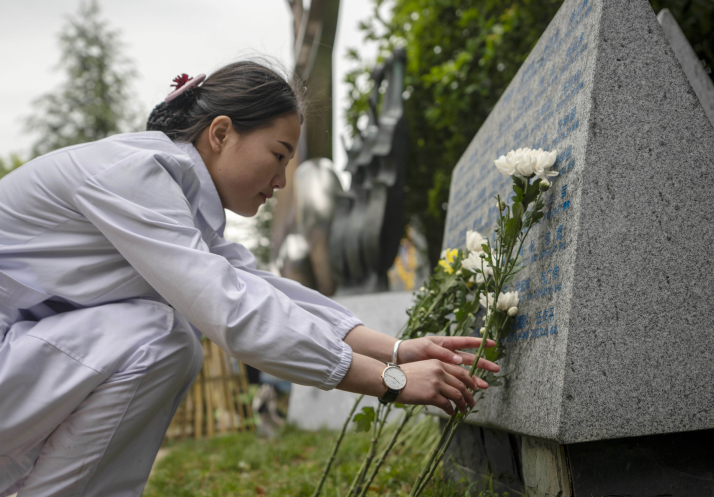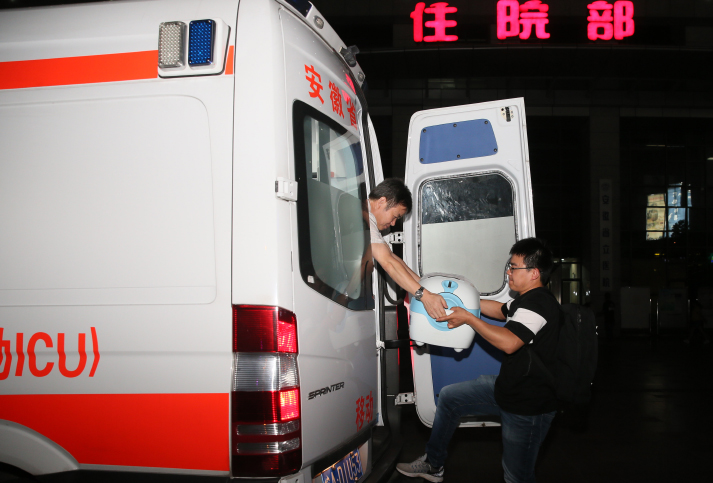|
||||||
|
||||||
| Home Nation World Business Opinion Lifestyle China Focus ChinAfrica Video Multimedia Columnists Documents Special Reports |
|
||||||
|
||||||
| Home Nation World Business Opinion Lifestyle China Focus ChinAfrica Video Multimedia Columnists Documents Special Reports |
| Nation |
| Significant progress in organ donation in the past decade |
| By Lu Yan · 2020-11-29 · Source: NO.49 DECEMBER 3, 2020 |
 A medical worker shows respect to a late organ donor in Kunming, Yunnan Province in southwest China, on April 3, 2019 (XINHUA)
On May 7, Lai Wenyu received an electronic card and a thank you letter from the China Organ Donation Administrative Center (CODAC), saying he had become the 1,185,092nd person to register on the platform and thus become an organ donor. "When I'm dead, my organs can still help other people, isn't it a good thing?" Lai told Beijing Review. Believing that donating one's organs and body to science after death can benefit medical study and research, the senior college student has registered to offer his whole body when he dies. It has been a decade since voluntary donation was introduced in China. By mid-November, the number of registered organ donors like Lai in the country had exceeded 2.58 million, according to CODAC. Gradual progress On March 1, 2010, the Red Cross Society of China (RCSC) and the country's health authorities jointly issued a notice on the pilot program of organ donation. After that, 10 provinces and cities launched organ donation pilot work. Three years later, donation efforts were rolled out across the nation. Since 2011, organ donation has been receiving financial support from the national lottery public welfare fund. More than 94 million yuan ($14 million) has been allocated to the work so far, providing stable funding support, according to CODAC. Organ donation has been written into the Civil Code adopted in May. Clauses state that no organization or individual should deceive, lure or coerce others into donating cells, tissues or organs, or the whole body. Furthermore, there is a ban on any form of trade in cells, tissues, and organs and the whole body. Different provinces and cities have also released local regulations for organ donation work. In 2015, China banned the use of executed prisoners' organs for transplantation, making voluntary donation the sole legitimate source. Nowadays, people can register to become a donor via CODAC's account on social media app WeChat or its official website, in addition to on-site registration. A report on China's organ donation said the number of registered donors is expected to rise above 3 million by 2024. All donations are traceable in the China Organ Transplant Response System (COTRS), a unified computerized system for organ donation and allocation within the country. Launched in 2011, the COTRS takes the urgency of the patient's condition and the degree of compatibility between a donor and a recipient as its main criteria. "Such a system can ensure scientific, transparent, fair and just allocation of organs," Wang Haibo, who is in charge of the system, told People's Daily. The COTRS has been certified by the China Information Technology Security Evaluation Center, and methods have been adopted, such as monitoring the operations taking place at the related medical institutions, to ensure the information security of donors, recipients and the organ distribution process, and protect the privacy of patients. China recorded more than 6,300 cases of organ donations in 2018, ranking second globally in the number of organ donations and transplants, according to the National Health Commission. More than 30,000 donors' donations saved over 90,000 lives, according to the RCSC. "Each donor in the system has a serial number, which is a unique ID," Wang said, "Behind each number are stories of the persons and families involved."  Staff members transport donated organs to a hospital in Hefei, Anhui Province in east China, on August 22, 2018 (XINHUA)
Donation coordinator Liu Yuan works at Beijing Youan Hospital. In 2014, the surgeon became a coordinator for organ donation and transplantation activities. At that time, there were only 1,154 trained organ donation coordinators across the country, whereas today that number has more than doubled. "Organ donation is voluntary. My only purpose is to explain to you related policies and procedures, as well as your rights and obligations. Whether you agree or disagree, it is a rational decision made by your family, and we respect it." For six years, Liu has been repeating these words every time he meets with the family members of a potential donor. He believes that communication with family members is key to the entire organ donation coordination process. One of the most unforgettable cases for Liu was a young man who had been declared brain-dead after several unsuccessful surgeries to remove a tumor. Though devastated, the young man's father decided to donate his organs. Such decision-making is difficult. Liu said when a patient is in a critical condition, the family members are often incredibly sad, adding barriers to communication. "In the past, organ donation was a concept that some people had never heard of before, let alone accept it instantly," he told The Beijing News. Nevertheless, Liu has witnessed a change in people's attitude toward organ donation in recent years as more people are becoming informed and regulations have improved, especially in Beijing. He said when he first took the job, he could succeed twice or thrice out of 10 attempts. Now, he estimates that five out of 10 coordination efforts are fruitful. For six years, he has successfully coordinated more than 310 organ donation cases, and registered as a donor himself. Some organ donations are suspended because the donor's condition improves. Such "failed coordination" fills Liu with a sense of relief. "Although the donation doesn't work, a life has been saved," he said. In addition to informing recipients' families of potential organ donors, many organ donation coordinators volunteer to help them with handling other matters, such as consulting insurance companies. "When I hear them say 'thank you,' I feel that all the work has paid off. This is the most powerful motivation for doing the job," Cao Huifang, an organ donation coordinator who has been on the job for 10 years, said in November at an event in honor of the 10th anniversary of the implementation of voluntary organ donations in Hangzhou, Zhejiang Province in east China.  (Print Edition Title: The Gift of Life) Copyedited by Elsbeth van Paridon Comments to luyan@bjreview.com |
| About Us | Contact Us | Advertise with Us | Subscribe |
| Copyright Beijing Review All rights reserved 京ICP备08005356号 京公网安备110102005860号 |